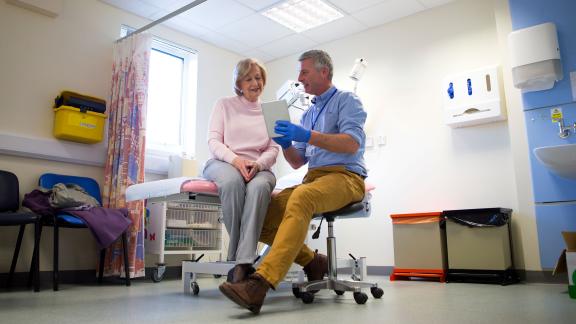Information for guardians of safe working hours
19 September 2025

Access the resources that GoSWH will need in order to fulfill their roles. It includes, a job role specification, checklist of things to do, templates for annual reports and more.
This page will be amended ahead of the exception reporting reform implementation date, 4 February 2026.
To be notified of these changes please sign up to the workforce bulletin.
The guardian of safe working hours (GoSWH) ensures that issues of compliance with safe working hours are addressed by the doctor and the employer or host organisation as appropriate. It provides assurance to the board of the employing organisation that doctors' working hours are safe.
Resources for GoSWH
This section includes information and resources that the guardians of safe working hours will need to fulfil the role.
- Job description (.doc)
- Checklist of things to do (.doc)
- Guidance and templates on guardian of safe working hours quarterly and annual reports (pdf)
- Template annual report for lead employer guardians (.doc)
- Template quarterly report for lead employer guardians (.doc)
- Protocol and suggested terms of reference for a regional guardian network (pdf)
- Junior doctors forum guidance (pdf)
- Checking your dashboard (pdf)
- Exception reporting flow chart - training issues (pdf)
- Exception reporting flow chart - safety issues (pdf)
- Rota rules at a glace
- Relevant TCS schedules for guardians (pdf)
- Clarification on roles of DME and guardian of safe working hours (pdf) - guidance from the National Association of Clinical Tutors (NACT)
-
Here are the most frequently asked questions about the role of the guardian of safe working hours.
Q1. What safeguards does the contract offer to ensure that doctors are working in line with their work schedule?
The system of exception reporting outlined in the 2016 contract will ensure that departures from planned working hours, working pattern or access to planned training opportunities are recorded. Work schedule reviews should take place where this happens consistently and can be requested by the employer or the doctor.
Your role as the guardian of safe working hours is designed to reassure junior doctors and employers that rotas and working conditions are safe for doctors and patients.
You will oversee the work schedule review process and will seek to address concerns relating to hours worked and access to training opportunities. You will support safe care for patients through protection and prevention measures to stop doctors working excessive hours and will have the power to levy financial penalties where safe working hours are breached.
Fines will be levied when working hours breach one or more of the following provisions:a) The 48 hour average weekly working limit
b) Contractual limit on maximum of 72 hours worked within any consecutive 7-day period
c) Minimum 11-hour rest has been reduced to less than 8 hours
d) Where meal breaks are missed on more than 25 per cent of occasions.Where you can validate such exception reports, penalties will be levied against the department where the doctor works; the fine will be set at four times the basic or enhanced rate of pay applicable at the time of the breach. The doctor will receive 1.5 times the applicable locum rate, and you will retain the remainder of the penalty amount.
e) The minimum non-resident on-call (NROC) overnight continuous rest of five hours between 22:00 and 07:00
f) The maximum 13-hour shift length
g) The minimum 11 hours rest between resident shifts
h) The minimum 8 hours total rest per 24-hour NROC shift
You will convene a junior doctors’ forum at regular intervals to provide advice on the role and to scrutinise the disbursement of penalty fines. You will provide regular and timely reports on the safety of doctors' working hours, rota gaps and annually on improvement plans to resolve rota gaps to the trust board. This information will be incorporated into the trust’s quality account and made available to the Local Negotiating Committee (LNC), Care Quality Commission (CQC), Health Education England (HEE), General Medical Council (GMC) and the General Dental Council (GDC). The doctors and dentists review body may also ask for annual reports on the outcome of work schedule reviews.
Q2. How did the Acas agreement change the duties, responsibilities and accountability of the guardian of safe working hours?
The core role for the guardian is the same following the agreement reached with the British Medical Association (BMA) leadership at Acas on the 2016 contract, although some things have changed, and some additional aspects of the role have been agreed.- The guardian will now report at least quarterly to the trust board, rather than annually.
- A consolidated annual report will be included in the trust’s quality account, and details of the disbursement of fines included in the organisation’s annual report.
- The guardian and director of medical education (DME) will jointly establish a junior doctors forum (or fora) to provide advice on and support the work of the guardian.
- The guardian will oversee the imposition of fines where doctors miss 25 per cent or more of their breaks.
- New arrangements have been put in place to ensure that doctors in GP practice placements or in organisations with few trainees have access to a suitable guardian.
- Doctors will have the right to involve a representative from the BMA or other relevant trade union in any work schedule appeal process.
- The guardian will be subject to a performance management framework that includes feedback from doctors in training, and doctors will be able to raise any concerns they might have about the performance of guardian through the medical director.
- The guardian's oversight of safe working hours will also include monitoring associated equality and diversity issues.
Q3. How will exception reporting work and how quickly will issues be resolved?
The process for reviewing work schedules based on exception reports is designed to be more agile and reactive than the old contract system of hours monitoring and banding appeals. Employers will need to have an electronic system in place to manage exception reports.
Doctors should report exceptions where day-to-day work varies from that set out in the work schedule either in hours of work (including rest breaks) or the agreed working pattern, including the educational opportunities made available. Reports should be submitted, and copied to the guardian of safe working hours, as soon as possible, and in any case within 14 days (7 days if payment is requested and within 24 hours where there are immediate safety concerns).
Upon receipt of an exception report, the educational supervisor will discuss with the doctor what action is necessary to address the exception and to ensure that it remains an exception. Where exceptions become more regular or frequent, a work schedule review will usually be required.
The process is designed to address issues as they arise within a training programme, so that any subsequent changes put in place as a result of discussion or more formal review can benefit the doctor in post as well as doctors moving into that placement in the future.
Employers should agree local policies or processes for exception reporting that provide a local framework and process for the submission and review of exception reports.
Q4. What systems can we use for the exception reports for the guardian?
Skills for Health and Allocate have exception reporting systems. Employers who wish to create their own system are free to do so, and those who do not use either system will need to make their own arrangements.
Q5. What is the guardian’s role in monitoring and resolving rota gaps?
The guardian must include data on rota gaps in each quarterly report to the board. A consolidated annual report on rota gaps together with an improvement plan to reduce identified rota gaps must be included in the trust’s quality account and shared with the local negotiating committee (LNC).
Q6. Does the guardian have a role in resolving issues around access to education?No, the DME will need to resolve any issues around access to educational opportunities that are reported through exception reports.
Q7. What happens if the appointed guardian is also an educational supervisor?
Where the appointed guardian is already an educational supervisor, the board and doctors forum should be aware of any potential conflict of interest. A number of actions could be taken to mitigate such conflict, including but not limited to:- The guardian to relinquish the educational supervisor role, using the allocated time to perform the guardian duties; or
- An alternate guardian is appointed to manage any issues relating to trainees for which the guardian is an educational supervisor (more practical in large organisations where more than one guardian may be appointed); or
- A reciprocal arrangement between guardians of neighbouring trusts could be developed to manage any issues relating to trainees for which the guardian is an educational supervisor.
Q8. Can clinical supervisors undertake some or all the educational supervisor role with regards to exception reports and work schedule reviews?
Yes, however, as the role of the educational supervisor is explicitly described in the 2016 TCS , there would need to be a formal scheme of delegation or local policy agreed for the clinical supervisor to undertake aspects of this role and all parties, including any affected doctors or dentists in training, must be informed about the arrangements.
Q9. How much time should be allocated for the role of guardian of safe working?
As with other supporting professional functions, there is no national standard tariff for the time that should be allocated to perform the guardian of safe working role. Employers should ensure allocations are sensible, appropriate, realistic and in keeping with normal job planning guidelines for managerial appointments. In most circumstances, one would expect the time allocation to be the same as that allocated to departmental head of service or clinical director in the same organisation, although this might be higher or lower depending on the number of doctors in training, the number of and stability of rotas and the amount of administrative support available to you. It is important that employers regularly review these arrangements. All guardians are encouraged to include any issues around time allocation and/or support for their role in their first quarterly board report.
Q10. What admin support allocation should be made available for the guardian in terms of hours?
The decision for the amount of administration support needed should be agreed locally. Employers need to consider the number of doctors in training, the number and variety of rotas, and the degree of stability in existing working patterns when assessing how much time and support will be needed to carry out the role effectively. We would suggest that arrangements put in place now are reviewed regularly, and certainly no later than the first quarterly report, to maintain the right level of support.
Q11. Is the guardian responsible in the first instance for all hours and safety issues?
No, you are the champion of safe working hours, and are a backstop if normal processes haven’t resolved an issue. You should be copied in to all exception reports so that you can fulfil your oversight role and escalate things as necessary, but you are not expected to be involved in every issue. Employers will need to consider what system they have in place for you in order to support the administration of the role and the management of exception reports. Ideally all issues should be sorted at a local departmental level, by the doctor’s clinical or educational supervisor.
Q12. How should I respond if doctors raise questions about pay or other aspects of the contract unrelated to safe working hours?
As guardians establish channels of engagement with doctors and dentists in training across their organisations, it is inevitable that they will be asked to comment on aspects of the 2016 contract or on individual employment matters which fall outside of the remit of the guardian. It is important that doctors with such questions are advised to discuss such matters with the medical staffing or HR department, or to seek advice from their representative organisation, the BMA.
Q13. Can the doctors’ forum be convened as a virtual forum?
Yes, where doctors are geographically dispersed, a virtual forum could be an appropriate way of engaging a wider range of doctors in the forum. There are many different versions of webinar and virtual conferencing software that could help to facilitate such virtual meetings.
Q14. Can trusts change the job description?
The published job description is a template and would need to be customised for local use; it is expected that it might therefore be subject to some modification. However, the job description cannot be changed in such a way that the role would no longer meet the description of the role as set out in the 2016 TCS. For example, the job description could not be changed to appoint a guardian to only review exception reports that have been filtered by managers. However, while the guardian must have access to all exception reports, they would not normally be expected to intervene until managers have first tried to resolve the issue.Q15. What role does the guardian play for doctors in training who are not on 2016 terms and conditions?
Contractually there is no guardian role for trainees who are employed on other terms and conditions. Such doctors may include, for instance:- doctors employed on the 2002 contract for doctors in training
- academic trainees on university terms and conditions
- trust grade doctors
- defence medical services trainees on Ministry of Defence (MoD) arrangements.
However, it is intended that all doctors in training should have access to a guardian to ensure safe working hours, so locally, employers may wish to formally extend aspects of the guardian role to this group so as to ensure that the guardian and board receive a full picture of how safe working hours are for all of their doctors in training. It is possible that in some circumstances, by agreement with the LNC, this could include access to some aspects of the system of exception reporting. Where the trainee is substantively employed by another employer or funded by an external party (e.g. the MoD), such arrangements should be also be agreed with that employer/funder.
Clarity about these trainees’ access to the guardian would be particularly important when preparing the report on rota gaps. Any local policy that extends the guardian role in this way would not replace any existing contractual right to rota monitoring for this group of doctors. If this group continued to monitor hours via diary cards rather than exception reports (the most practical, and contractually safe, solution) then employers would probably need to use the exception reports of the doctors on the 2016 TCS to complement the monitoring data to give a full picture for monitoring purposes. These trainees would have access to the guardian if they felt that their concerns were not being addressed via hours monitoring (or other mechanisms) and their monitoring results should also be included in the quarterly guardian report.
Q16. Could the guardian also be a SAS doctor?
The job description and person specification is only a template and neither the BMA nor NHS Employers have been prescriptive about what grade the guardian can be. If employers have SAS doctors, or other members of staff, in their trust who can demonstrate that they will be able to effectively fulfil the requirements of the role, including appropriately challenging more senior colleagues when required, and who can gain the confidence and approval of doctors in training, then the answer is yes and there is no reason why an SAS doctor or other staff member cannot apply for and undertake this role.
Q17. Guardian of safe working hours - whom can we appoint?
The guardian is not an educational role and should be completely separate to avoid conflicts of interest. The guardian should not under any circumstances be the director of medical education (DME) or hold any other role in the organisation’s management structure. When considering someone for the guardian role the employer should consider the time necessary to do the role as well as any issues of duality or possible conflicts of interest. The aim is to recruit someone in whom the junior doctors can have confidence and who will be able and willing to stand up against the organisation’s management team if necessary.
Q18. What process should we follow for the appointment of the guardian of safe working hours?
The following principles should be taken into account in appointing to the role.- It is the employer’s responsibility to appoint the guardian.
- The appointment panel for the guardian should comprise the medical director or a nominated deputy, the director of HR/workforce or a nominated deputy, and two doctors in training, nominated by the local negotiating committee (LNC) or equivalent. At least one and if at all possible, both of the doctors in training must be based in the appointing employer (or host organisation, if appropriate). In exceptional circumstances, where an employer deems it desirable that additional panel members are involved in the interview and decision to appoint, then this should be discussed and agreed with the LNC.
- The panel must reach consensus on the appointment.
- The recruitment process for the appointment of the guardian should otherwise follow local recruitment processes.
- The employer (and/or host organisation, if appropriate) will have discretion to set and allocate the guardian’s time commitment, taking into consideration the number of rotas and the number of doctors in training for whom the guardian will have responsibility. Such allocations should be sensible, appropriate, realistic and in keeping with normal job planning guidelines for managerial appointments. In most circumstances, one would expect the time allocation to be similar to that allocated to clinical/service line lead roles in the same organisation, although this might be increased or decreased depending on the number of doctors in training, rotas and/or the amount of administrative support available to the guardian.
- Employers / host organisations can choose to act collaboratively to make and share the appointment across a number of employers.
Q19. What happens if a trust has not appointed a guardian by the date set or if the post becomes temporarily vacant in the future?
In some circumstances, employers have not been able to agree an appointment to the guardian role and at points in the future it is likely that they may be short periods of time when the guardian role is vacant. In such cases, employers / host organisations will need to put an interim arrangement in place to ensure that the role of the guardian can be temporarily covered until a substantive appointment can be made. These temporary arrangements should be agreed with the local negotiating committee (LNC).
Where trusts are finding it difficult to attract applicants to the role, they may want to consider contacting their neighbouring trusts for advice, widening the role to other staff groups, and / or reviewing the remuneration package and time allocation on offer and /or ensuring that there is appropriate administration support for the role.
Q20. What support will be offered to the guardians of safe working hours prior to them starting in their role?
NHS Employers has agreed to provide the following support:- a dedicated web page of resources for guardians
- guidance (including flow charts) on exception reporting and the role of the education supervisor
- an annual national networking event.
-
Here are the most frequently asked questions about the role of the exception reporting process.
Q1. What safeguards does the contract offer to ensure that doctors are working in line with their work schedule?
The system of exception reporting outlined in the 2016 contract will ensure that departures from planned working hours, working pattern or access to planned training opportunities are recorded. Work schedule reviews should take place where this happens consistently and can be requested by the employer or the doctor.
The role of the guardian of safe working hours is designed to reassure junior doctors and employers that rotas and working conditions are safe for doctors and patients. Employers will need to ensure that the guardian of safe working hours role is appointed jointly with junior doctors, and in line with a national person specification before 3 August 2016 . Where this has not been possible, the employer must ensure interim arrangements are in place until such time as the guardian takes up office.
The guardian will oversee the work schedule review process and will seek to address concerns relating to hours worked and access to training opportunities. They will support safe care for patients through protection and prevention measures to stop doctors working excessive hours and will have the power to levy financial penalties where safe working hours are breached.
Fines will be levied when working hours breach one or more of the following provisions:
a) The 48 hour average weekly working limit
b) Contractual limit on maximum of 72 hours worked within any consecutive 7-day period
c) Minimum 11-hour rest has been reduced to less than 8 hours
d) Where meal breaks are missed on more than 25 per cent of occasions.
e) The minimum non-resident on-call (NROC) overnight continuous rest of five hours between 22:00 and 07:00
f) The maximum 13-hour shift length
g) The minimum 11 hours rest between resident shifts
h) The minimum 8 hours total rest per 24-hour NROC shift
Where the guardian can validate such exception reports, penalties will be levied against the department where the doctor works; the fine will be set at four times the basic or enhanced rate of pay applicable at the time of the breach. The doctor will receive 1.5 times the applicable locum rate, the guardian will retain the remainder of the penalty amount.
The guardian will convene a junior doctors’ forum at regular intervals to provide advice on the role and to scrutinise the disbursement of penalty fines. The guardian will provide regular and timely reports on the safety of doctors' working hours, rota gaps and annually on improvement plans to resolve rota gaps to the trust board. This information will be incorporated into the trust’s quality account and made available to the Local Negotiating Committee (LNC), Care Quality Commission (CQC), Health Education England (HEE), General Medical Council (GMC) and the General Dental Council (GDC). The doctors and dentists review body may also ask for annual reports on the outcome of work schedule reviews.
Q2. How will exception reporting work and how quickly will issues be resolved?
The process for reviewing work schedules based on exception reports is designed to be more agile and reactive than the old contract system of hours monitoring and banding appeals. Employers will need to have an electronic system in place to manage exception reports by October 2016 when the first doctors transition to the 2016 contract. Existing rota software providers are working to create such a system for their customers.
Doctors should report exceptions where day-to-day work varies from that set out in the work schedule either in hours of work (including rest breaks) or the agreed working pattern, including the educational opportunities made available. Reports should be submitted, and copied to the guardian of safe working hours, as soon as possible, and in any case within 14 days (7 days if payment is requested and within 24 hours where there are immediate safety concerns).Upon receipt of an exception report, the educational supervisor will discuss with the doctor what action is necessary to address the exception and to ensure that it remains an exception. Where exceptions become more regular or frequent, a work schedule review will usually be required.
The process is designed to address issues as they arise within a training programme, so that any subsequent changes put in place as a result of discussion or more formal review can benefit the doctor in post as well as doctors moving into that placement in the future.
Employers should agree local policies or processes for exception reporting that provide a local framework and process for the submission and review of exception reports.
Q3. What systems can we use for the exception reports for the guardian?
Skills for Health and Allocate have exception reporting systems. Employers who wish to create their own system are free to do so, and those who do not use either system will need to make their own arrangements .
Q4. Who will be the guardian of safe working for GP trainees for the period that they are in their general practice placement and not in a hospital?
Where lead employer arrangements exist, the lead employer will be responsible for ensuring that there is a guardian appointed for all trainees, including GP trainees. GP practices and the lead employer should work in partnership to ensure arrangements are in place which facilitate this arrangement. Where no such lead employer arrangements are in place, it will be for the employer (the GP surgery) to identify and appoint an appropriate person to act as the guardian, in line with the requirements of the 2016 contract. The terms and conditions of service (CS) sets out provisions for the appointment of guardians where an employing organisation has fewer than 20 trainees.
Q5. For doctors in lead employer arrangements, how are any potential fines managed while the doctor is in a general practice placement?The nature of placements in GP practices mean that it is extremely unlikely that a guardian fine would ever be levied.
However, if for some reason a doctor working in a practice placement does breach the rules and a guardian fine needs to be levied, then the system will work in the same was as for hospital based trainees. The employer will need to make a penalty payment to the doctor and to the guardian (or in the case of breaks, just to the guardian). In lead employer arrangements, the general practice will need to inform the lead employer where a fine has arisen, so that the lead employer can make any payments necessary to the doctor (as they pay the doctor) and transfer the relevant fine amount to their guardian responsible for trainees in general practices. The lead employer may then arrange to re-charge the general practice for this sum, as obviously better management of the situation could have meant the fine was avoided. This will depend on any agreements/memorandum of understanding (MOU) governing the lead employer arrangement between the lead trust and the practices.
Q6. Do fines for 5 hrs and 8-hour rest breaches occur in the case of one single breach or will they be dependent on averages?The introduction of these fines will in many cases mean that on call rotas can no longer be sustained for most specialties.
The fine is applied to a breach of the core rest limit and concerns arrangements around safe working in the shift immediately following the NROC where the rest breach occurs (see provisions in schedule 3 para 31-33 of the terms and conditions of service). It is a measure to ensure doctor and patient safety are not compromised. These breaches shouldn’t be happening on a regular basis and if they are, that’s an indicator that reviewal of the pattern is needed to look at the root causes and to put measures in place to avoid recurrent breaches.
Q7. Will the trust have the authority to allocate time off in lieu (TOIL) in the event that agreement cannot be reached between doctor and trust within 4 weeks?
If TOIL has been agreed as the compensatory outcome of an exception report by both parties, it should be done so under the expectation that the TOIL can be reasonably taken. Where this does not occur, the TOIL should automatically be converted to pay after that 4-week period. At the end of a placement, any untaken TOIL will be converted into pay.



